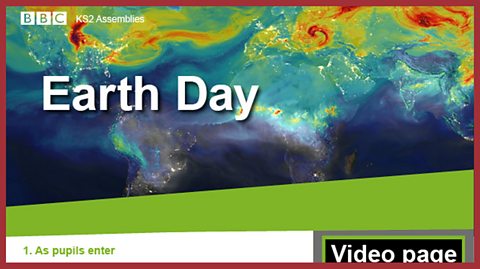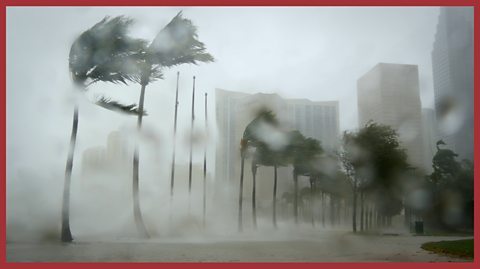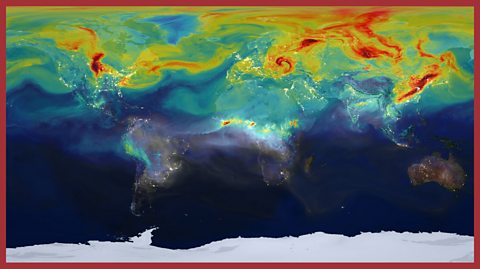In short...
Themes: celebrating Earth Day; climate change and living sustainably; taking action to preserve the environment.
Summary: this assembly is suitable for use on or shortly before Earth Day (22 April each year). It can be used at other times of year to consider climate change and the need to live sustainably. The first Earth Day happened on 22 April 1970 in the USA, in response to a spill from an oil tanker. It has since grown to become a global event marked by many millions of people around the world.
Resources: The framework to download / print (pdf), a photo of palm trees during a hurricane and an illustration of global weather patterns.

The video
On the 22nd of April each year people all around the world celebrate Earth Day.
It’s an opportunity to highlight the importance of caring for the planet by taking part in a range of specially organised events.
The first Earth Day took place in 1970 in the United States in response to a spill from an oil tanker.
20 million people took part in the very first Earth Day from all over the US.
It is now a day marked by over a billion people in countries around the world.
We’ve all become aware of the need to protect our beautiful but fragile planet from the effects of climate change. Climate change is the long-term change in temperature and weather patterns on the planet.
Many children and young people are speaking out on the need for action.
(Young demonstrator) I can tell you for sure, because of the rising global temperatures, the weather patterns are changing, and we are experiencing extreme weather events from floods to droughts to landslides, to hurricanes and this is only going to get worse.
Someone else who has been urging us all to take action is Greta Thunberg.She started the Fridays for Future demonstrations that lots of schoolchildren around the world have taken part in.
This has inspired other movements with similar goals too.
(Young demonstrator) According to surveys, 59% of young people like me are extremely worried about climate change. Climate change isn’t just some world problem, it is happening now and is affecting all of us.
Human activities are the main cause of temperatures increasing, largely due to burning of fossil fuels like coal, oil and gas that release carbon dioxide that warms the planet.
Switching to cleaner energy, like wind or solar power, would make a big difference, and many people around the world are urging their governments to make that happen.
(Young demonstrator) We are making people listen and act now to help save our planet.
(Young demonstrator) I think they should just get their act together, save the planet.
(Young demonstrator) If we do not look after our planet, we are not looking after ourselves. So many things we take for granted are just going to stop.
These young people are all passionate about protecting our planet and educating others about the issues.
So, what actions can we take?
The organisers of Earth Day have plenty of suggestions for how we can all get involved and help to make a difference.
In our gardens and schools, we can plant flowers to encourage pollinating insects.
Pollinators such as bees and butterflies, are essential for preserving many plant species. They help to protect biodiversity and ecosystems by moving pollen between flowers to help them reproduce.
We can get involved with organisations that are planting trees in local parks and gardens.
Trees are very good at absorbing carbon dioxide from the air, so are a helpful way of slowing down global warming.
Plastic pollution is one of the worst problems in our environment. So, recycling plastic, and avoiding using single-use plastics, will help too.
And we can all help with air pollution as well. Walking, cycling, or scooting to school can help to prevent more fumes from cars going into the air we breathe.
Earth Day is a time to remember that we are all responsible for caring for the planet.
Making small changes can have a big impact.
Change begins with taking action!
Can you do one thing today to help?
Earth Day is marked on 22 April each year. The first Earth Day was held in the USA in 1970, in response to a spill from an oil tanker. It has since grown to become and global event, during which as many as 1 billion people around the world mark the need for action on the environment and living sustainably.
One consequence of global warming is an increase in extreme weather events. Global warming is a result of the release of carbon dioxide into the atmosphere, the main cause of which is the burning of fossil fuels such as coal, oil and gas. There is an ongoing switch to cleaner forms of energy, such as wind and solar power, but many protestors feel that the transition needs to happen more urgently. At the current time - 2023 - the UK government has a commitment to achieve 'net zero' by 2050.
The organisers of Earth Day have plenty of suggestions for how we can all make a difference: plant pollinating flowers to preserve biodiversity; plant trees to help with the capture of carbon; reduce use of plastic and avoid single-use plastic; walk or cycle to school if possible.
Duration: 4' 14"
Last words: 'Can you do one thing today to help?'
Video questions
- When and where was the first Earth Day held? (1970 in the USA)
- How many people took part in the first Earth Day (20 million)
- What is climate change? (The long term change in weather patterns due to warming, the greatest cause of which is the burning of fossil fuels)
- What are some examples of fossil fuels? (Coal, oil, gas)
- What are examples of cleaner energy? (Wind, solar)
- What are actions we can all take to help slow global warming/climate change? (Plant flowers to preserve biodiversity; plant trees to help capture carbon; reduce use of plastic; walk or scooter to school if possible)

Key links
Assembly framework (pdf) document
Download / print the assembly framework ready for use

Image: palm trees in a hurricane. image
Click to display image full size

Illustration: global weather patterns. image
Click to display image full size


Suggested assembly framework
1. Entry
Play your chosen music and display a focus image if you wish.
2. Introduction
Ask the assembly if anyone has heard of Earth Day. If anyone has, ask them to explain what Earth Day is. If not, ask everyone to suggest what Earth Day might be about. Gather responses. When ready, tell pupils: Earth Day is a special day each year when people around the world come together to raise awareness of environmental issues and their impact on the planet. Earth Day is not a new thing…but its importance today is greater than ever because of the growing threat posed by climate change. We're going to watch a short video about Earth Day and, as you watch, think about what simple things you could do to help…
3. The video
Play the video. The duration is 4' 14" and the final words are: 'Can you do one thing today to help?'
After the video - Time to talk
Aid pupils recall of the video and their understanding of it by asking some, or all, of the following questions:
- Can you remember when Earth Day is each year? (22 April)
- The first ever Earth Day in 1970 happened in response to what? (A spill from an oil tanker)
- Why do you think this event inspired 20 million people to come together and protest? (Oil spilled into the sea kills wildlife and washes ashore where it pollutes the environment)
- What is climate change? (The long-term change in weather patterns around the world)
- Can you remember some of the effects that climate change is having on our planet? (Droughts, hurricanes, etc - looking for an awareness of increased frequency and severity of extreme weather events)
- What is the main cause of climate change? (Human activity - in particular the burning fossil fuels like coal, oil and gas)
- What can we do to try to reduce the future impact of climate change? (Stop burning fossil fuels and use cleaner energy - like wind and solar power - instead)
- What are some of the things we can all do to protect and preserve our planet? (Any reasonable response - eg planting flowers for pollinators / planting trees to absorb carbon dioxide / reducing the amount of single-use plastic we use / walking, cycling or scooting to school instead of driving, if possible)
Conclude by asking pupils: Turn to the person next to you and tell them one simple thing you could do today to help make a difference.
5. Opportunity to sing
Suggestions from BBC collections below.
6. Opportunity for reflection
Focus your reflection on the reasons we mark Earth Day every year.
Sit quietly now as we think about the things we've heard today…
We've heard that Earth Day is an opportunity on one special day each year to raise awareness of environmental issues and the impact of climate change in particular…
We've heard how climate change is already having an impact around the world and its consequences could get worse…
But we've also heard about some of the ways we can all help to make a difference and slow the effects of climate change…sometimes by doing very simple things…
As we mark Earth Day, let's remember that it’s our responsibility to look after our planet, because it’s the only one we’ve got…
How could you help to make it Earth Day every day?
7. Opportunity for prayer
Begin with your usual form of address ('Dear God', 'Dear Lord', 'Let us pray', etc) and:
Thank you for the people who work to raise awareness of the environmental issues facing our beautiful, but fragile planet.
Thank you for giving us the power to have an impact on the future by making changes now.
Help us to remember that change happens when we take action.
Amen.

Suggested songs
'Reduce! Reuse! Recycle!' (© BBC 2021)
We have got a message for you.
Listen to what you must do.
We need to save energy,
Protect the earth and air and sea!
Reduce! Reuse! Recycle!
Reduce! Reuse! Recycle!
We have got a message for you.
Listen to what you must do.
When you go to bed at night,
Turn off screens and turn off lights!
Reduce! Reuse! Recycle!
Reduce! Reuse! Recycle!
We have got a message for you.
Listen to what you must do.
Instead of driving, take a walk,
Then you can relax and talk!
Reduce! Reuse! Recycle!
Reduce! Reuse! Recycle!
We have got a message for you.
Listen to what you must do.
When you clean your teeth at night,
Switch the tap off, do what’s right!
Reduce! Reuse! Recycle!
Reduce! Reuse! Recycle!
We have got a message for you.
Listen to what you must do.
Try to use much less plastic,
Do your bit and feel fantastic!
Reduce! Reuse! Recycle!
Reduce! Reuse! Recycle!
Reduce! Reuse! Recycle!
Reduce! Reuse! Recycle!
Stop and think! (© BBC 2021)
Can you see the rubbish
Lying on the ground?
The wind picks up the plastic bags
Blows them all around.
If you want a healthy planet
It’s all down to you
So when you eat your crisps and sweets
Here’s what you can do:
Stop and think! Throw it in!
Put your rubbish in the bin!
Come on now, we need to care
For this wonderful world we share!
Stop and think! Throw it in!
Put your rubbish in the bin!
Come on now, we need to care
For this wonderful world we share!
Packets, tins and paper
Old banana skins
Foil and plastic wrappers
Cartons, straws and tins.
In the woods and parks, on beaches
On the pavements, in the street
Don’t be a messy litter-bug,
Don’t drop things at your feet.
[Chorus]
We all want a happy world
We need to respect it
Keep it healthy, green and clean
Let’s try to protect it.
You can get recycling
There are bins for different things
Glass and plastic, cardboard too
It’s all down to you!
[Chorus]
'For the beauty of the earth' (Come and Praise, no 11)
